Posted on Tuesday, November 22nd, 2016
Colleges are full of energy and helping students tap into activities that are outside of their daily routine of attending classes can go a long way in enriching a student’s college experience. Unfortunately, not all students take advantage of the many enhanced learning opportunities that are presented on college campuses.
At Algonquin College’s Waterfront Campus, there is a vibrant co-curricular program that gives students an opportunity to volunteer in a structured way that allows them to capture their extra curricular activities on a transcript.
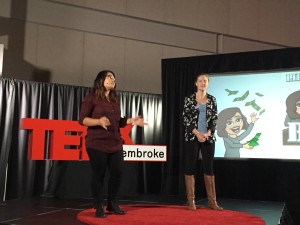
A student’s co-curricular record can be very useful when they are pursuing their first job within their field as it demonstrates to potential employers their motivation, transferable skills and dedication to supporting special projects, all things that most employers are interested in when hiring a new employee. Essentially, it gives a new graduate an advantage when trying to get their resume to the top of the pile.
In recent weeks, there have been a number of great examples of co-curricular activities on campus. These have included students participating in Pembroke’s annual Santa Claus parade, students volunteering at a very successful TEDxPembroke event, and two Outdoor Adventure Naturalist students engaging in an applied research project to develop interpretive signage for the Kiwanis Walkway, that runs next door to the Waterfront Campus.
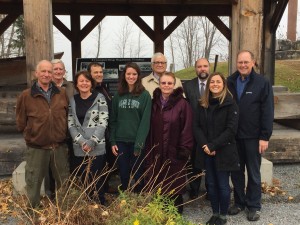
Students come to college to obtain a credential and ultimately a career in the field that most interests them, but by broadening their experience to include co-curricular activities, they can expand their network of contacts, feel good about contributing to college and community activities and be rewarded for their efforts.
In a competitive labour market, having an impressive co-curricular record can make the difference in getting your career off to a great start.
Posted by Jamie Bramburger, Manager of Community and Student Affairs.
Posted on Sunday, November 6th, 2016
Have you ever been captivated by a speaker who has you hanging on every word that comes out of their mouth? There are few public speakers who have that much charisma, but when it does happen, it’s magical.
 As a fan of TED Talks, I’ve had that experience. I’ve been mesmerized by thought provoking presentations by ordinary people who had a good idea to share. In a world where ideas are often discovered through digital platforms, there’s still something special about being in the same room as a speaker who has a good story to tell.
As a fan of TED Talks, I’ve had that experience. I’ve been mesmerized by thought provoking presentations by ordinary people who had a good idea to share. In a world where ideas are often discovered through digital platforms, there’s still something special about being in the same room as a speaker who has a good story to tell.
TED Talks has been inspiring millions of people around the world to share ideas, primarily in short but pointed talks intended to stimulate collaboration. These talks are delivered in front of a live audience and then shared with others through the internet.
As a non-profit organization, TED has evolved to include independently organized TEDx events that allow communities to make great ideas accessible and to spark conversation. For the first time, a TEDx event is coming to Pembroke through the efforts of Algonquin College’s entrepreneurship initiative.
 On Saturday, November 12th the College will present TEDxPembroke with seven dynamic speakers taking the stage. They will include the Chief Paramedic and Director of Emergency Services for Renfrew County, Mike Nolan and the Chief Executive Officer of Canadian Nuclear Laboratories, Mark Lesinski.
On Saturday, November 12th the College will present TEDxPembroke with seven dynamic speakers taking the stage. They will include the Chief Paramedic and Director of Emergency Services for Renfrew County, Mike Nolan and the Chief Executive Officer of Canadian Nuclear Laboratories, Mark Lesinski.
Under the theme of “Dream Big,” Lesinski will explore the potential opportunities that could come from the development of small modular nuclear reactors. Nolan will focus his presentation on innovative leadership in preventative ambulatory care for older adults.

Mitch Kurylowicz is the founder and driving force behind Project Jenga, a non-profit organization working to promote and fund-raise for gender equality in Kenya. He will talk about how luck influences our lives and how we need to make our own luck.
Craig Gauthier is a self-proclaimed “geek” who has tried many things from film-making to writing books. The Pembroke native will focus his talk on finding your keys to success.
Dr. Duncan Stewart is the Director General of Canada’s National Research Council. His talk will be on the importance of entrepreneurship and innovation, particularly in rural regions. Two students from Algonquin’s Environmental Technician program will also speak, Aarika Charlebois and Emily Krutzelmann, both sharing personal journeys to success.
 During the event some popular TED Talks will also be shown. The event runs from 3 to 6 p.m. with a few tickets still remaining. The cost is approximately $35 and includes a complimentary non-alcoholic beverage and desserts. Get your tickets here >>.
During the event some popular TED Talks will also be shown. The event runs from 3 to 6 p.m. with a few tickets still remaining. The cost is approximately $35 and includes a complimentary non-alcoholic beverage and desserts. Get your tickets here >>.
Bringing a TEDx event to the college is an exciting initiative. It complements the college’s successful speaker series and also supports its efforts to inspire its students, faculty and the general public to embrace entrepreneurialism and innovative thinking. Through the sharing of great ideas and dreaming big, we can all help our region be more prosperous.
Posted by Jamie Bramburger, Manager of Community and Student Affairs
Posted on Sunday, September 25th, 2016
 As the leaves change colour, it’s time for senior high school students to start thinking about their post-secondary plans. Algonquin College’s Waterfront Campus will be holding its annual Open House Career Fair on Thursday, October 6th, an opportunity for students to meet with faculty, admissions and financial aid officers to have their college questions answered.
As the leaves change colour, it’s time for senior high school students to start thinking about their post-secondary plans. Algonquin College’s Waterfront Campus will be holding its annual Open House Career Fair on Thursday, October 6th, an opportunity for students to meet with faculty, admissions and financial aid officers to have their college questions answered.
The event is held in partnership with the College Information Program (CIP), meaning high school students can also speak with representatives from all 24 Ontario publicly funded colleges. This one-stop shopping opportunity can really help students make informed decisions on where the programs they are interested in are offered, what admission standards do they need to meet, and how much will their college education cost?
 Algonquin College’s Open House is normally attended by more than 300 high school students from across Renfrew and Pontiac Counties, and some students also travel from other areas of the province to learn more about the unique programs that are offered at the Waterfront Campus. These programs include two brand new ones that are being offered for the first time in the Fall of 2017: Action Sports and Park Development; and Urban Forestry-Arboriculture.
Algonquin College’s Open House is normally attended by more than 300 high school students from across Renfrew and Pontiac Counties, and some students also travel from other areas of the province to learn more about the unique programs that are offered at the Waterfront Campus. These programs include two brand new ones that are being offered for the first time in the Fall of 2017: Action Sports and Park Development; and Urban Forestry-Arboriculture.
In the past, the Open House has been a one day event, but this year it will also be offered on Wednesday, October 5th from 6:30 to 8 p.m. in the campus gymnasium. This will allow parents, younger high school students, and mature students to connect with faculty about their burning college questions. The gym will be full of interactive displays for each of the 21 full-time programs that are offered at the Waterfront Campus.

Admission to both Open House events is free. Students who are attending the daytime Open House on October 6th will have access to bus transportation to get to the college. That event will run from 11:30 a.m. to 2:30 p.m.
Applications for the Fall 2017 intake will be available soon on the Ontario College Application Service. Now is the time to start exploring your future.
Posted by Jamie Bramburger, Manager of Community and Student Affairs
Posted on Thursday, September 8th, 2016
In the world of post-secondary education, there really isn’t any as exciting as orientation week. Each fall, the start of the school year brings together a new group of students who are full of energy and enthusiasm, and eager to meet new people as they start their college journey.
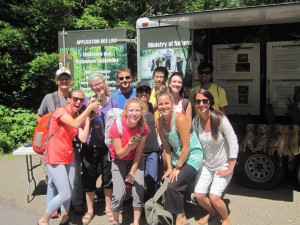 At many colleges, orientation is the first time that students are meeting their new classmates, but at Algonquin College’s Waterfront Campus, in many cases, it’s an opportunity to connect with familiar faces. The reason is the campus has increasingly created more opportunities for students to get to know each other through pre-orientation activities such as Program Awareness Camps held each spring and Jump Start pre-academic preparation programs offered in August.
At many colleges, orientation is the first time that students are meeting their new classmates, but at Algonquin College’s Waterfront Campus, in many cases, it’s an opportunity to connect with familiar faces. The reason is the campus has increasingly created more opportunities for students to get to know each other through pre-orientation activities such as Program Awareness Camps held each spring and Jump Start pre-academic preparation programs offered in August.
With about 50 percent of the campus student population having to re-locate to Pembroke, these early interventions have become critically important in helping students succeed. It’s the first step to ensure they are comfortable in their new surroundings.
In fact, many students and families have connected with the campus on several occasions before orientation week arrives. They have attended an Open House, taken a campus tour, or participated in a program awareness camp where students experience what their program is going to be like through interactive learning exercises led by their faculty.
 Through these early connections, students have been able to stay in contact with other incoming students throughout the summer months via social media, phone calls, texting or even face-to-face meetings. When they arrive for orientation, the nervousness has subsided because they are greeted by another student who they have already gotten to know quite well.
Through these early connections, students have been able to stay in contact with other incoming students throughout the summer months via social media, phone calls, texting or even face-to-face meetings. When they arrive for orientation, the nervousness has subsided because they are greeted by another student who they have already gotten to know quite well.
Orientation week is packed with activities. There are free lunches, whitewater rafting trips, a pub, movie nights, yoga sessions, bubble soccer in the gymnasium, board games and a move in day BBQ for students living in residence. The social activities will continue over the next few weeks as the school year starts, and students gradually settle into their academic programs.
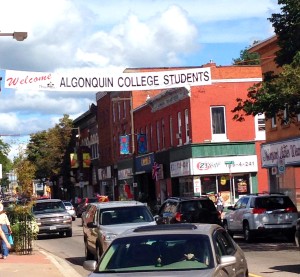
The value of a robust orientation program can never be questioned, but for many of our students it’s just an extension of the relationships they started building with other students several months ago. For younger students, in particular, this approach goes a long way in helping them get off to a good start at college.
Posted by Jamie Bramburger, Manager of Community and Student Affairs
Posted on Tuesday, August 16th, 2016
On November 22, 1963, three shots rang out in Dealey Plaza in Dallas, Texas, fatally wounding the 35th President of the United States. Now, 53 years later, students at Algonquin College’s Waterfront Campus in Pembroke will have an opportunity to delve deeper into the circumstances of President John F. Kennedy’s assassination.
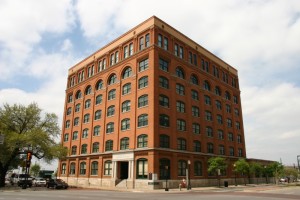
Through a partnership with the Sixth Floor Museum in Dallas, the College will be offering four live webinars that will cover topics relevant to the aftermath of the most investigated murder in North American history. The classes will originate from the crime scene where Lee Harvey Oswald, a general labourer at the former Texas School Book Depository building, leaned out of a sixth floor window, took aim and fired at the President’s motorcade. Two of the shots hit the President, the last one delivering a fatal blow.
 Within a few hours, police had arrested Oswald, charging him with the murder of the President and Dallas police offer. J.D. Tippit. Swarmed by reporters, the Dallas police struggled to conduct their investigation and respond to the media’s interest in Oswald. Two days after the assassination, Oswald himself was murdered by Dallas nightclub owner Jack Ruby while being transferred to a county jail.
Within a few hours, police had arrested Oswald, charging him with the murder of the President and Dallas police offer. J.D. Tippit. Swarmed by reporters, the Dallas police struggled to conduct their investigation and respond to the media’s interest in Oswald. Two days after the assassination, Oswald himself was murdered by Dallas nightclub owner Jack Ruby while being transferred to a county jail.
Beginning October 20th and continuing for four consecutive Thursday evenings, staff at the Sixth Floor Museum will facilitate live webinars that will include question and answer sessions covering topics such as, what did Dallas Police find in the first 24 hours of their investigation? There is also a Living History session that will allow students to speak with John Sparks, a high school trumpet player who performed at the President’s breakfast in Fort Worth, Texas, just a few hours before the assassination in Dallas.
 Sparks went on to become a long time Dallas and Forth Worth Television producer who always maintained an active interest in the Kennedy assassination and was instrumental in saving some original television footage of the assassination coverage, when it was in danger of being destroyed.
Sparks went on to become a long time Dallas and Forth Worth Television producer who always maintained an active interest in the Kennedy assassination and was instrumental in saving some original television footage of the assassination coverage, when it was in danger of being destroyed.
The JFK series will also include a session with museum curator Stephen Fagin who will hold an open forum with students, allowing them to ask questions about the museum, the conspiracy theories that continue to surround the assassination, and President Kennedy’s legacy.
What do you think happened on November 22, 1963 when President Kennedy was assassinated in Dallas? Share your thoughts on this blog.
Registration for the JFK series is now open on the College website and in person by visiting the Waterfront Campus in Pembroke. Space is limited for each of the sessions.
See the full listing of Fall 2016 Night Classes available at Algonquin College’s Waterfront Campus.
Post Script: Algonquin College’s Jamie Bramburger visited the Sixth Floor Museum in July of 2016 and interviewed the Curator of Collections, Lindsey Richardson. Watch the interview here to learn more about the work of the Museum.
Posted by: Jamie Bramburger is the Manager of Community and Student Affairs at Algonquin College’s Waterfront Campus in Pembroke
Posted on Wednesday, July 27th, 2016
It’s in the DNA of colleges to be partners with business. Since their inception in 1967, Ontario’s publicly funded colleges have had a primary focus to prepare students to fill the workforce needs of the province’s employers. They’ve done this by staying connected to industry to ensure the curriculum being taught to students is relevant and by building a huge network of partnerships with employers that allow students to gain on-the-job training while in school.
 Now, a provincial panel looking into what Ontario needs to do to keep its workforce competitive has made several key recommendations. The Premier’s Highly Skilled Workforce Panel was chaired by former Renfrew-Nipissing-Pembroke MPP Sean Conway, who calls the panel’s work, “A matter of urgent and pressing priority driven by changing demographics and evidence that the future net growth of Ontario’s labour force will be provided through immigration.”
Now, a provincial panel looking into what Ontario needs to do to keep its workforce competitive has made several key recommendations. The Premier’s Highly Skilled Workforce Panel was chaired by former Renfrew-Nipissing-Pembroke MPP Sean Conway, who calls the panel’s work, “A matter of urgent and pressing priority driven by changing demographics and evidence that the future net growth of Ontario’s labour force will be provided through immigration.”
Here are the six key overarching recommendations made by the panel:
- Building stronger partnerships between educators and employers by establishing a new Planning and Partnership Table, supported by a new Workforce Planning and Development Office within government. Employers, educators, labour, government and others would work through this table to drive solutions for skills and talent development, and for experiential learning. And Industry Tables would address mismatches between the skills that industries need and what the workplace offers
- Increasing access to job market information by working with the federal government to help lead the creation of a national system to give employers and job-seekers better access to information such as where jobs exist and which skills employers will need in the future
- Expanding opportunities for learning by experience by funding more placements so that every student completes at least one experiential learning opportunity before graduating from high school, and another before finishing college or university
- Promoting both traditional and non-traditional career paths by increasing students’ exposure to options including the arts, science, engineering, technology, skilled trades and entrepreneurship
- Investing in human capital by launching programs to support training in the workplace and encouraging large employers to share successful training programs with small and medium-sized enterprises
- Closing gaps in skills and competencies by finding ways to teach and recognize the skills that students learn, such as teamwork, problem solving and entrepreneurial spirit, and by developing training programs for groups underrepresented in the workplace to allow them better access to employment opportunities.
While preparing its report, the panel visited several Ontario communities and spoke with dozens of stakeholders about the most pressing workforce needs. One of those visits was at Algonquin College’s Waterfront Campus in Pembroke where more than 25 local business and education leaders provided feedback from a rural Ontario perspective.
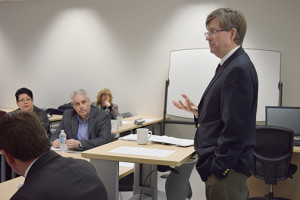 The benefits of building a strategy to integrate retiring military personnel into the civilian workforce was an idea that surfaced at the Pembroke session and found its way into the report. There was also a lot of discussion about the need for more support to guidance counsellors to help student transitions from high schools to post-secondary and the ongoing need to have timely data on labour market trends and opportunities. These ideas also garnered attention in the report.
The benefits of building a strategy to integrate retiring military personnel into the civilian workforce was an idea that surfaced at the Pembroke session and found its way into the report. There was also a lot of discussion about the need for more support to guidance counsellors to help student transitions from high schools to post-secondary and the ongoing need to have timely data on labour market trends and opportunities. These ideas also garnered attention in the report.
During a news conference announcing the panel’s findings, Premier Kathleen Wynne stated, “The panel’s recommendations will not stay on a dusty shelf,” and Minister of Advanced Education and Skills Development, Deb Matthews, called the report “An aspirational document that provides a framework to build a truly integrated partnership that links the education system with businesses.”
There is no question that Colleges will continue to be an integral part of the government’s plans to address its workforce challenges, but the report clearly states that there is still work to do, such as the expansion of co-operative education placements for more college students.
In the final analysis, the recommendations are intended to help Ontario prosper and they place business-education partnerships at the centre of the plan. That’s good for colleges and even better for students and employers.
Read the full Building the Workforce of Tomorrow: A Shared Responsibility report >>
Read more reaction to the Panel’s Recommendations:
Posted by Jamie Bramburger, Manager of Community and Student Affairs
Posted on Saturday, July 9th, 2016
 It’s true that most college bound students have their plans in place for this fall, but that doesn’t mean it’s too late to apply to a college program. In fact, every summer there is a small panic among hundreds of students who are frantically trying to get everything in place to enroll in college.
It’s true that most college bound students have their plans in place for this fall, but that doesn’t mean it’s too late to apply to a college program. In fact, every summer there is a small panic among hundreds of students who are frantically trying to get everything in place to enroll in college.
So, why do they leave it so late? In many cases it is circumstances, but more frequently they are dealing with a stomach pit of uncertainly of what lies ahead. Many applicants are simply worried they won’t be accepted into college or they won’t be successful.
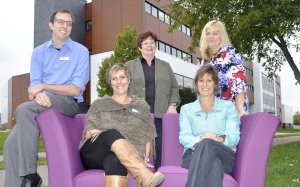 One of the great things about today’s college system is that there are plenty of supports to help students succeed, and that support starts before they actually begin their classroom studies. Through the admissions process there will be helping hands from staff who work in counselling, registration, student recruitment and financial aid.
One of the great things about today’s college system is that there are plenty of supports to help students succeed, and that support starts before they actually begin their classroom studies. Through the admissions process there will be helping hands from staff who work in counselling, registration, student recruitment and financial aid.
Whether it’s taking a campus tour, having transcripts reviewed to determine whether an applicant has the necessary pre-requisites for a program, or learning about student loans and grants, a summer applicant can quickly get the answers they need to make an informed decision.
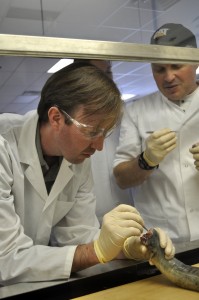 While many college programs will now be closed or wait-listed because all of the seats have been filled, there are still dozens of programs that have availability. For example, programs like Business, Office Administration-Executive, Construction Techniques and Environmental Technician at Algonquin College’s Waterfront Campus remain open to applicants.
While many college programs will now be closed or wait-listed because all of the seats have been filled, there are still dozens of programs that have availability. For example, programs like Business, Office Administration-Executive, Construction Techniques and Environmental Technician at Algonquin College’s Waterfront Campus remain open to applicants.
There’s no question that having a post-secondary credential has become paramount to a person’s ability to progress in the workplace. Increasingly, employers are asking for a minimum of a college certificate or diploma as a starting point to be considered for a job posting. That reality is the primary factor that drives a person’s decision to enroll in a college program.
Colleges have always been accessible to people of all ages and educational backgrounds. Whether it’s a student coming directly from high school, a university graduate who is enrolling in college to strengthen their practical skills within their field of study, or a laid off middle age worker who is training for a new career, there are plenty of options available to students.

So, if you’ve been procrastinating about applying to college, you’re not alone. Hundreds of would-be college students are struggling with the same decision this summer. The good news is, it’s not too late!
If you would like more information you can also register for our upcoming Discovery Evening on Thursday, August 4 @ 6:30 p.m.
Posted by Jamie Bramburger, Manager of Community and Student Affairs at Algonquin College’s Waterfront Campus.
Posted on Tuesday, June 21st, 2016
 Jason Blaine continues to pay it forward. The Canadian Country Recording Artist and high profile Algonquin College Business program alumnus recently held his annual concert and golf tournament in Pembroke, raising a record $80,000 for local organizations in his home town.
Jason Blaine continues to pay it forward. The Canadian Country Recording Artist and high profile Algonquin College Business program alumnus recently held his annual concert and golf tournament in Pembroke, raising a record $80,000 for local organizations in his home town.
Now into its third year, the charity has brought in a whopping $205,000, money that has supported great local causes such as the Pembroke and Area Boys and Girls Club, the capital campaign for Algonquin College’s Waterfront Campus and Mental Health First Aid training for not-for-profit organizations.
 With Dallas Smith and Jason McCoy of The Roadhammers in town for the event, Blaine and “A Few Good Friends” put on a great performance at the Pembroke Memorial Centre, while also allowing themselves to be auctioned off for the following days’ golf tournament. The live auction alone brought in $30,000 and set the tone for the fundraiser which has become a signature summer social event in the city.
With Dallas Smith and Jason McCoy of The Roadhammers in town for the event, Blaine and “A Few Good Friends” put on a great performance at the Pembroke Memorial Centre, while also allowing themselves to be auctioned off for the following days’ golf tournament. The live auction alone brought in $30,000 and set the tone for the fundraiser which has become a signature summer social event in the city.
More than 600 people attended the concert which is intended to be an intimate night with the stars, where fans can mingle and have their photos taken with the artists, while enjoying some of the top performers in Canada’s country music industry. Pembroke native Ben Rutz, the lead fiddler in the Johnny Reid band, the Western Swing Authority and “up and coming,” the River Town Saints also took the stage.

The following morning, with only a few hours sleep, Blaine was up early to appear on the CTV Ottawa Live Morning Show to talk about his charity and to say thank you to the dozens of businesses, organizations and individuals who have supported him over the years. He then capped his day by playing a round of golf with more than 160 others before unveiling how much the event had raised.
While very few Algonquin College alumni have the profile that Jason Blaine does, we know that many are giving back to their community in special ways. We’re proud of all of our graduates and hope that Jason Blaine’s act of kindness is an inspiration. Blaine may live in Nashville, but his heart is in Pembroke and with his alma mater.

Posted by Jamie Bramburger, Manager of Community and Student Affairs
Posted on Sunday, May 29th, 2016
For most senior college students their educational journey is coming to an end. They have completed their academic studies and are beginning their job search. Getting that first job is important. In fact, it needs to be the priority, but pausing to celebrate all that they have accomplished is also important. Unfortunately, too many community college graduates don’t attend their convocation ceremony.
So the question is why don’t they attend? I’ve chatted with a few graduates, and here are the top five reasons they gave me for not attending.
- I plan on being employed and I don’t want to ask for a day off to attend graduation.
- I’m moving away and it’s too far to travel to come back for the graduation ceremony.
- Most of my close friends from college won’t be attending, so I don’t want to celebrate alone.
- It’s not a big deal to me. I’m not into ceremonies.
- My family left the decision up to me and I opted not to attend.
So, now let me share the top five reasons why graduates should attend their convocation ceremony.
- Later in life, they will regret not attending. As we get older we have a greater appreciation for everything that we have accomplished and looking back on grad photos is a reminder of the hard work that needed to be done to earn a certificate, diploma or degree.
- It’s not just about the graduate. For parents, spouses and family members the celebration of a college graduate is just as meaningful for them as it is for the grad. While some parents will be passive and let the graduating student decide on whether to attend, trust me, inside they want their grad in the procession. Snapping that photo of a son, daughter or spouse walking across the stage in their gown and receiving their diploma from the President of the College is a moment of pride that they want to experience.
- Convocation ceremonies are fun. Yes, there is some down time when all of the graduates have their moment on stage, but for the most part, the ceremony is filled with inspirational messages, plenty of smiles and the anticipation of an even greater celebration with family and friends when the auditorium empties.
- You never know who is watching and paying attention in the audience. This is particularly true for award winning graduates who may catch the attention of a prospective employer as they are acknowledged for their academic prowess and college success in their field of study.
- It’s the right thing to do. Convocation ceremonies are the closing of a chapter in a person’s life. It may not be the last time a graduate enters into an educational program, but for now, it needs to be marked as a very special moment in time, just like a marriage or the birth of a child. Graduating from a post-secondary program can be life-changing, and it needs to be recognized in a formal way.
In closing….
- Your new boss will probably understand if you let them know up front when your graduation ceremony is being held and that you would like to attend.
- Call your fellow graduates and encourage them to participate. You’ll be amazed how influential you can be. If you need to travel, make it a great road trip to see some very dear friends. You’ll be glad you made the effort.
- Give it is the importance it deserves. It really is a “big deal.” Do it for your parents or partner. They do care and want you to be at the ceremony. Most importantly, do it for yourself!
- Life is too short. Fill it with great memories of your accomplishments. Your grad photos will live on for family generations to follow.
Algonquin College’s Waterfront Campus will be celebrating its 2016 graduating class on Friday, June 3rd at 2:30 p.m. at the Pembroke Memorial Centre. I hope this blog will convince all of our graduates to attend.
Post by: Jamie Bramburger, Manager of Community and Student Affairs at Algonquin College’s Waterfront Campus.
Posted on Monday, May 2nd, 2016
When Algonquin College started seriously talking about building a new campus in Pembroke in 2006, the project vision became known as Renaissance Square. The project envisioned a new beginning for the College and for Pembroke’s historic downtown, which had struggled for many years as the retail sector pushed away from the city’s inner core.
Now, four years after the Waterfront Campus opened, Pembroke is really starting to experience a renaissance. The most obvious example is the opening of two privately owned and operated student residences, and the recent start of construction on a third purposefully built apartment building for students.
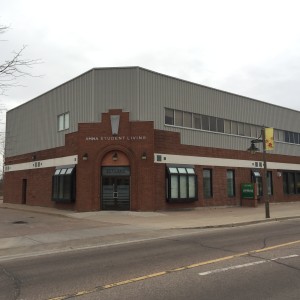
 AMNA Student Living was the first residence to open in the fall of 2014. The former Lakeside Medical Clinic had been vacant for a few years before it was purchased by a developer who took advantage of its close proximity to the new campus. The building was gutted and renovated to include spaces for 49 students. Most of the units are singles, and the residence includes a common kitchen and lounge area for students to socialize.
AMNA Student Living was the first residence to open in the fall of 2014. The former Lakeside Medical Clinic had been vacant for a few years before it was purchased by a developer who took advantage of its close proximity to the new campus. The building was gutted and renovated to include spaces for 49 students. Most of the units are singles, and the residence includes a common kitchen and lounge area for students to socialize.
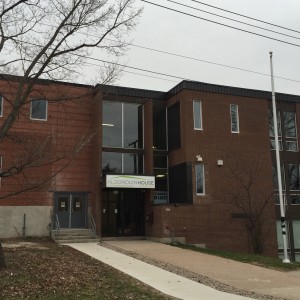
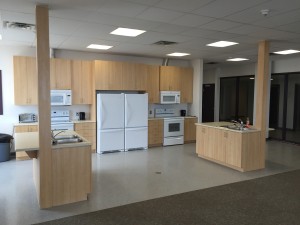 The second residence, Algonquin House, opened in the fall of 2015 in the former Algonquin College Pembroke Campus. After the College sold the building, the new owners made extensive renovations to allow the front of the building to be used for doctor offices and a pharmacy, while the larger portion of the building was converted to a student residence for more than 70 occupants.
The second residence, Algonquin House, opened in the fall of 2015 in the former Algonquin College Pembroke Campus. After the College sold the building, the new owners made extensive renovations to allow the front of the building to be used for doctor offices and a pharmacy, while the larger portion of the building was converted to a student residence for more than 70 occupants.
Construction on the third residence started a few weeks ago. This residence doesn’t have a name yet, but the developer plans to have it ready for the summer of 2017. The four-storey building will accommodate approximately 50 students in three-bedroom apartments.

The Campus has been gradually growing its enrolments and now attracts almost 50 percent of its close to 1,000 full-time students from outside of Renfrew County. The growing out-of-town student population has built a strong business case for private investment in student housing, generating new tax revenue for the city of Pembroke and creating more options for out-of-town students who are looking for accommodations while studying at the Waterfront Campus.
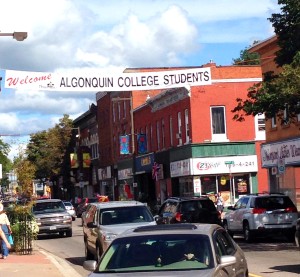 And it’s not only the student housing market that is benefiting from the Waterfront Campus. The entire downtown has a much more positive vibe. Storefronts that were once vacant are filling up, shop owners are improving their facades, developers are buying up properties and investing in them, and merchants are welcoming Algonquin’s students to their businesses.
And it’s not only the student housing market that is benefiting from the Waterfront Campus. The entire downtown has a much more positive vibe. Storefronts that were once vacant are filling up, shop owners are improving their facades, developers are buying up properties and investing in them, and merchants are welcoming Algonquin’s students to their businesses.
The building of the Waterfront Campus is the best thing to happen to Pembroke’s downtown in decades and it may be just the tip of the ice berg. The renaissance is well underway.
Posted by Jamie Bramburger, Manager of Community and Student Affairs


 As a fan of
As a fan of 

 During the event some popular TED Talks will also be shown. The event runs from 3 to 6 p.m. with a few tickets still remaining. The cost is approximately $35 and includes a complimentary non-alcoholic beverage and desserts. Get your tickets
During the event some popular TED Talks will also be shown. The event runs from 3 to 6 p.m. with a few tickets still remaining. The cost is approximately $35 and includes a complimentary non-alcoholic beverage and desserts. Get your tickets 







 Sparks went on to become a long time Dallas and Forth Worth Television producer who always maintained an active interest in the Kennedy assassination and was instrumental in saving some original television footage of the assassination coverage, when it was in danger of being destroyed.
Sparks went on to become a long time Dallas and Forth Worth Television producer who always maintained an active interest in the Kennedy assassination and was instrumental in saving some original television footage of the assassination coverage, when it was in danger of being destroyed.

 It’s true that most college bound students have their plans in place for this fall, but that doesn’t mean it’s too late to
It’s true that most college bound students have their plans in place for this fall, but that doesn’t mean it’s too late to 











